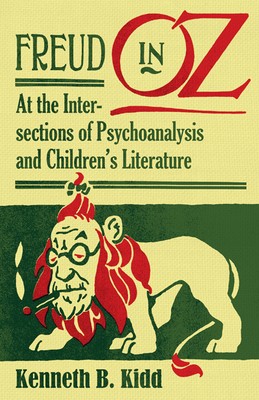
- We will send in 10–14 business days.
- Author: Kenneth B Kidd
- Publisher: University of Minnesota Press
- ISBN-10: 081667583X
- ISBN-13: 9780816675838
- Format: 14 x 21.3 x 2 cm, minkšti viršeliai
- Language: English
- SAVE -10% with code: EXTRA
Reviews
Description
Children's literature has spent decades on the psychiatrist's couch, submitting to psychoanalysis by scores of scholars and popular writers alike. Freud in Oz turns the tables, suggesting that psychoanalysts owe a significant and largely unacknowledged debt to books ostensibly written for children. In fact, Kenneth B. Kidd argues, children's literature and psychoanalysis have influenced and interacted with each other since Freud published his first case studies.
In Freud in Oz, Kidd shows how psychoanalysis developed in part through its engagement with children's literature, which it used to articulate and dramatize its themes and methods, turning first to folklore and fairy tales, then to materials from psychoanalysis of children, and thence to children's literary texts, especially such classic fantasies as Peter Pan and Alice's Adventures in Wonderland. He traces how children's literature, and critical response to it, aided the popularization of psychoanalytic theory. With increasing acceptance of psychoanalysis came two new genres of children's literature--known today as picture books and young adult novels--that were frequently fashioned as psychological in their forms and functions.
Freud in Oz offers a history of reigning theories in the study of children's literature and psychoanalysis, providing fresh insights on a diversity of topics, including the view that Maurice Sendak and Bruno Bettelheim can be thought of as rivals, that Sendak's makeover of monstrosity helped lead to the likes of the Muppets, and that "Poohology" is its own kind of literary criticism--serving up Winnie the Pooh as the poster bear for theorists of widely varying stripes.
EXTRA 10 % discount with code: EXTRA
The promotion ends in 21d.02:14:49
The discount code is valid when purchasing from 10 €. Discounts do not stack.
- Author: Kenneth B Kidd
- Publisher: University of Minnesota Press
- ISBN-10: 081667583X
- ISBN-13: 9780816675838
- Format: 14 x 21.3 x 2 cm, minkšti viršeliai
- Language: English English
Children's literature has spent decades on the psychiatrist's couch, submitting to psychoanalysis by scores of scholars and popular writers alike. Freud in Oz turns the tables, suggesting that psychoanalysts owe a significant and largely unacknowledged debt to books ostensibly written for children. In fact, Kenneth B. Kidd argues, children's literature and psychoanalysis have influenced and interacted with each other since Freud published his first case studies.
In Freud in Oz, Kidd shows how psychoanalysis developed in part through its engagement with children's literature, which it used to articulate and dramatize its themes and methods, turning first to folklore and fairy tales, then to materials from psychoanalysis of children, and thence to children's literary texts, especially such classic fantasies as Peter Pan and Alice's Adventures in Wonderland. He traces how children's literature, and critical response to it, aided the popularization of psychoanalytic theory. With increasing acceptance of psychoanalysis came two new genres of children's literature--known today as picture books and young adult novels--that were frequently fashioned as psychological in their forms and functions.
Freud in Oz offers a history of reigning theories in the study of children's literature and psychoanalysis, providing fresh insights on a diversity of topics, including the view that Maurice Sendak and Bruno Bettelheim can be thought of as rivals, that Sendak's makeover of monstrosity helped lead to the likes of the Muppets, and that "Poohology" is its own kind of literary criticism--serving up Winnie the Pooh as the poster bear for theorists of widely varying stripes.


Reviews